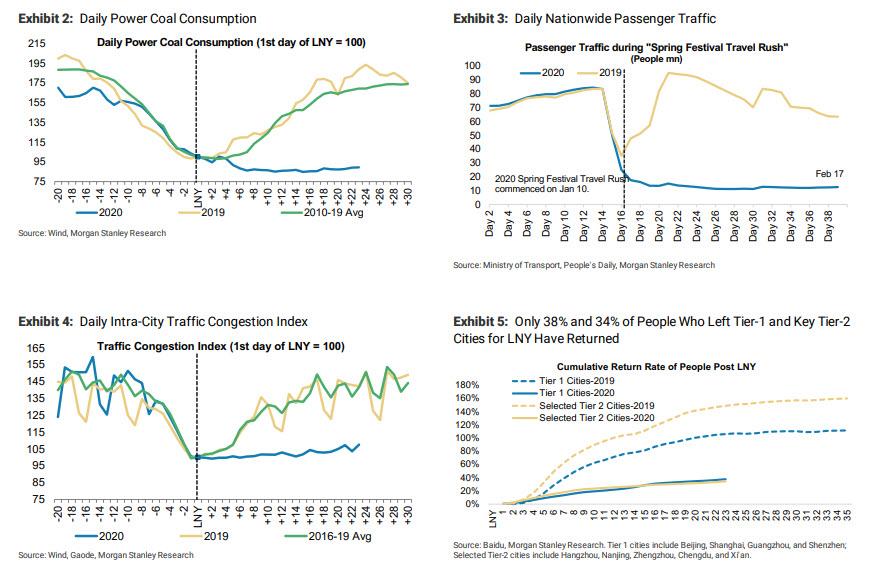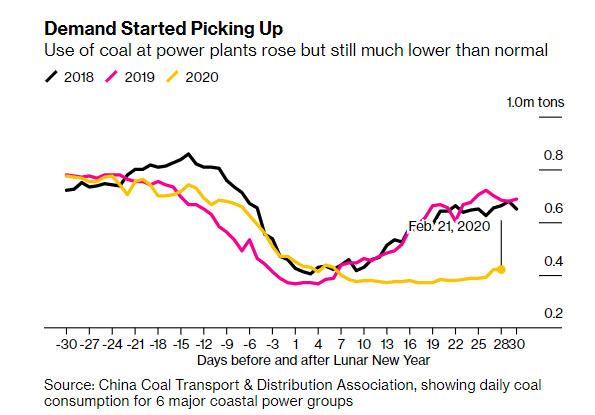Chinese Workers Refuse To Go Back To Work Despite Beijing’s Demands
When we commented earlier that the coronavirus pandemic means that the vast majority of Chinese small and medium enterprises (SMEs) have at most 2-3 months of cash left, a potentially catastrophic outcome that will not only crippled China’s economy but its $40 trillion financial system, we summarized the circular quandary in which Beijing finds itself, to wit:
… unless China reboots its economy, it faces an economic shock the likes of which it has never seen before in modern times. Yet it can’t reboot the economy unless it truly stops the viral pandemic, something it will never be able to do if it lies to the population that the pandemic is almost over in hopes of forcing people to get back to work. Hence the most diabolic Catch 22 for China’s social and economic system, because whereas until now China could easily lie its way out of any problem, in this case lying will only make the underlying (viral pandemic) problem worse as sick people return to work, only to infect even more co-workers, forcing even more businesses to be quarantined.
Shockingly (or perhaps not at all in light of China’s tremendous human rights record), Beijing has picked output over life expectancy, and in a furious scramble to restart its economy, which as we showed earlier remains flatlined…
… according to most high-frequency metrics, it has been “advising” people to get back to work, even as new coronavirus cases are still coming in, in the process threatening to blow out the current epidemic with orders of magnitude more cases as places of employment become the new hubs of viral distribution.
As Bloomberg picked up late on Sunday, following what we said earlier namely that “local governments around the country face a daunting question of whether to focus on staving off the virus or encourage factory reopenings” China’s central and local governments are one again easing the criteria for factories to resume operations “as they walk a tightrope between containing a virus that has killed more than 2,400 people and preventing a slump in the world’s second-largest economy.” This schizophrenic dilemma for a government which faces two equally terrible choices, was best summarized by the following two banners observed in China:
- Banner 1 says: “If you go out messing around now, expect grass on your grave to grow soon.“
- Banner 2 says, “Sitting at home eats up all your have, hurry up go out & find a job.”
Indeed, a perfectly schizophrenic message from the government to the people:
Banner 1 says: “If you go out messing around now, expect grass on your grave to grow soon.“ Banner 2 says, “Sitting at home eats up all your have, hurry up go out & find a job.” The slogan changes as frequently as they change the criteria for #COVID19 diagnosis. #coronavirus pic.twitter.com/2VnB5jZ0zz
— 曾錚 Jennifer Zeng (@jenniferatntd) February 23, 2020
https://platform.twitter.com/widgets.js
And yet, even with both options equally terrible, Beijing also has no choice but to pick one. As a result, as Bloomberg writes, “the rush to restart has been propelled by China’s leader Xi Jinping and top leaders, who are urging companies to resume production so the country can continue to meet lofty goals for growth and economic development in 2020.”
Regular Zero Hedge readers know the rest: with most of Chinese economic output paralyzed, officials in China’s provinces have taken up Xi’s call, with one region after another relaxing rules that had kept more than half the nation’s industrial base idle following the Lunar New Year holiday.
So as China undergoes a wholesale push to reboot its economy, there is certainly some success. AS Bloomberg notes, “about 600 kilometers east of the virus epicenter of Wuhan, vendors and customers at the Yiwu wholesale market in Zhejiang province are having their body temperature tested at the entrances after the vast complex that wholesales manufactured goods reopened on Tuesday, three days earlier than expected. Power demand has also started to pick up in China, with six major generators reporting that coal consumption – while still below pre-holiday levels – rose 7% on Feb. 20 from the previous day.”
Well, “pick up” may be a bit of an exageration but here it is: the smallest possible increment, yet still more than 50% below where it was on previous years, suggesting China’s economy is running at half of its capacity, which in GDP terms means an epic collapse, a lifetime away from the traditional 6%-7% Y/Y increase.
Ultimately, the core problem China is facing as we explained earlier today, is one of trust: trust by workers that their employers, and certainly the government, has their best interest in mind when it is urging everyone to get back to work. Or lack thereof.
“Our factory is still missing quite a lot of workers, so we can only resume limited production,” said Dong Liu, vice president of a textile manufacturer in Fujian, southeastern China, that employs more than 400 workers. Dong said he applied to the government on Feb. 17 to restart and the inspector came the next day and gave permission. “More and more factories are allowed to reopen this week,” he said, although as they reopen, they find the problem mentioned before: nobody is gullible enough to go back to work. After all why risk it if a return to the place of work with the pandemic still raging means a material chance of a death sentence?
Naturally, China’s massive population – while bombarded by propaganda on a daily basis – is hardly naive, and is very well attuned to what is really going on. And what is going on is that China’s economy has ground to a halt because nobody trusts the government anymore!
Even Bloomberg admits it: “the push to get production rolling again risks a renewed spread of the virus, about which much is still not yet known” (it’s certainly not known where it came from after Chinese scientists disproved the widely held propaganda narrative that it miraculously emerged from some bat at the Wuhan seafood market during the peak of bat hibernation season).
“A peak may come at the end of this month for the whole country but it won’t necessarily indicate a turning point,” Zhong Nanshan, a respiratory disease expert who led research into a treatment for SARS, told reporters in Guangzhou earlier this week. “The epidemic could have a new peak after people travel back to work.”
The last sentence is predicated on two major assumptions:
- that workers will decide they want to return to work; and
- that they will consider the outsized risk to their lives from returning to work as lesser than the threat to their livelihood from not receiving a salary.
And what happens if they all refuse to come back? What if China, sick of the lies and fabrications of its government, creates the largest, if completely unexpected, labor union in history and one which refuses to work and demands handouts from the government until the coronavirus pandemic is well and truly halted, something which can not be ascertained for a long, long time in light of the government’s flagrant and ongoing lies?
Meanwhile, the government schizophrenic, contradictory instructions continue:
“Every day several government departments send representatives to spot check our efforts to curb the virus,” said Melissa Shu, the company’s export manager. “They come from the district government, the center for disease control, the city government, at different times of day and check if we disinfect in time, whether we test the temperature of workers, whether workers have masks, whether one person has a separate lunch seat, whether lunch is properly arranged, etc, etc.”
Shu said at lunchtime, workers need to sit at least one meter apart (about three feet).
“As a result, we can’t ask all the workers to come to work even when they’re in town ready to work,” she said, adding that the plant has about 40-50 staff working in rotation, about half the number employed before the virus.
Ironically, some Chinese factories already have plenty of space, thanks to the long-running trade war with the U.S.
“Compared with the virus, that was much worse” said Hui Zhuo, founder of a wooden furniture manufacturer in Zhongshan, in the Pearl River Delta. “We’ve cut a lot of workers in the last two years — so I’m not too worried this time because the space in my factory is big enough to avoid being crowded.”
And speaking of trade war, if the long-running feud between the US and China wasn’t enough for Chinese customers to seek alternative supply chains, the coronavirus fiasco is sure to be the tipping point:
In the longer term, the outbreak is likely to exacerbate the damage wrought on China’s factories by the trade war. For some overseas customers in fast-moving industries like fashion, the factory shutdown amid the virus has been another wake-up call that may spur them to reduce their reliance on Chinese suppliers.
“I think for the next season or the next year’s goods, retailers would be looking at sourcing more from other countries,” said AJ Mak, CEO of Chain of Demand, which provides artificial-intelligence systems to retailers in Asia and the U.S. to predict product demand. “I think those conversations which started from the trade war would be definitely accelerated.”
The irony is that by the time most Chinese workers do return to their jobs, those jobs may not exist anymore.
Meanwhile China’s push to salvage its growth targets won’t be complete until the virus is fully under control – something that is impossible to predict, and will in fact be delayed the more China pushes to restore full factory staffing:
“When can everyone come back to work? No one knows,” said Shu at the Zhenjiang LED factory. “Logistics is still not yet fully resumed, inter-city transportation is still restricted. Only after the epidemic is fully controlled, we can truly return to normal work and life.“
What we do know, is that for now, when given the choice of the carrot or the stick, Chinese employers and the government are picking the carrot… for now. As China’s Global Times reported, fabrication giants such as Apple supplier Foxconn have rolled out incentives to encourage workers to return to their posts amid the coronavirus pandemic. In fact, the company’s factory in Zhengzhou said it would award 7000 yuan to back-to-work staff and give bonuses in stages to workers who clock in for up to 55 days.
Apple supplier #Foxconn‘s factory in Zhengzhou said it would award 7000 yuan to back-to-work staff and give bonuses in stages to workers who clock in for up to 55 days. Foxconn rolled out incentives to encourage workers to return to their posts amid the #COVID19: media reports pic.twitter.com/glx55EEPC1
— Global Times (@globaltimesnews) February 23, 2020
https://platform.twitter.com/widgets.js
So far such “carrot” approaches have failed to yield results, which leads us to think that a far worse eventuality is next: the stick.
And if China’s population was already furious at the inept response to the coronavirus pandemic, the information blackout, the self-serving lies by the communist party over the past two months, and the general lack of respect for ordinary people by China’s billionaire oligarchs, one can only imagine what happens to the mood across China’s workforce – the largest in the world – once the entire nation becomes one giant gulag, where everyone is forced to work for the greater good, or else…
Tyler Durden
Sun, 02/23/2020 – 20:55![]()
Zero Hedge’s mission is to widen the scope of financial, economic and political information available to the professional investing public, to skeptically examine and, where necessary, attack the flaccid institution that financial journalism has become, to liberate oppressed knowledge, to provide analysis uninhibited by political constraint and to facilitate information’s unending quest for freedom. Visit https://www.zerohedge.com

